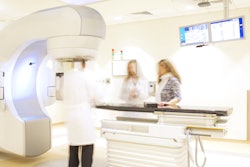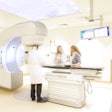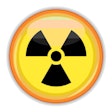A new subsection of the American Medical Association’s Current Procedural Terminology (CPT) code book has been established for reporting six new codes describing MR safety services, including implant or foreign body evaluation, safety consultation, electronics preparation, and implant positioning or immobilization. The new subsection is Magnetic Resonance (MR) Safety Implant/Foreign Body Procedures of the Radiology/Diagnostic Radiology (Diagnostic Imaging) section and it contains the codes along with the guidelines for reporting them.
 Erin Stephens.
Erin Stephens.
These new codes describe the work that takes place prior to an MRI study, including the proper assessment, consultation, and medical physics customization for patients who have an implant, device, or foreign body. Examples include cochlear implants, artificial valves, deep vagal stimulators, pacemakers, apnea devices, etc. Routine submission of these codes for every patient with an implant, device, or foreign body undergoing MR imaging is not expected.
The Medicare Physician Fee Schedule (MPFS) for 2025 established fees for the new codes as follows:
Code | Description | RVU value | Medicare fee |
76014 | MR safety implant and/or foreign body assessment, initial 15 minutes | G - 0.33 | $10.67 |
76015 Add-on
| Each additional 30 minutes | G - 1.59 | $51.43 |
76016 | MR safety determination by physician or other qualified healthcare professional responsible for the safety of the MR procedure | G - 2.20 PC - 0.84 | $71.16 $27.17 |
76017 | MR Safety Medical Physics Exam Customization | G - 6.79 PC - 1.07 | $219.63 $34.61 |
76018 | MR Safety Implant Electronics Preparation | G - 3.45 PC - 1.05 | $111.60 $33.96 |
76019
| MR safety Implant Positioning and/or Immobilization | G - 4.50 PC - 0.83 | $145.56 $26.85 |
| Note: G = Global, PC = Professional Component. Medicare Fee represents the national level using the CF of $32.3465 in effect as of 1/1/2025. | |||
Documentation and billing considerations
Procedure codes 76014 and 76015 are Technical Component (TC) codes that reflect the work of an MRI technologist and/or a medical physicist. They do not include any physician work value, but they would be available in the imaging center using global billing. The others contain a professional component that would be available for the radiologist to bill in either a hospital or imaging center setting.
Note that the physician performing the safety assessment does not have to be the same as the physician interpreting the MRI exam. In some cases, the safety assessment may determine that the MRI scan should not be performed; however, the appropriate safety codes may still be billed with no related imaging billing.
Each of the CPT code descriptions specifies that it includes a written report. The safety assessment documentation should be separate from the interpretation of the imaging examination, as the assessment may be conducted days or weeks before the actual MRI scan.
As time-based codes, 76014 and 76015 require that at least half of the stated time is completed to qualify for billing and the documentation for them should specify the exact time expended. They are performed by the non-physician staff, who normally are not responsible for creating such documentation, and so each facility will have to establish its own process to capture this work. The documentation should include the ordering physician’s information -- name and National Provider Identifier (NPI) number -- and the reason for the exam for billing purposes.
Physicians performing the assessment and developing the imaging customization for codes 76016 – 76019 should adequately describe the steps taken and the resulting parameters for the exam. The report for 76016, which can occur prior to the time of the exam, should include:
A risk-benefit analysis
Evaluation for conformance with the implanted device safety instructions
Consideration of alternative diagnostic tests when MRI is deemed to be inappropriate
The remaining codes (76017 – 76019) represent real-time interaction while the patient is present for the exam. Documentation relevant to the particular code should include:
· The conditions present that would necessitate an adjustment of the imaging protocol
A description of the adjustments made
Any limitations of the exam as a result of the protocol adjustments
A description of the real-time adjustments to the programming of the patient’s device
A description of the steps taken to immobilize the patient or position a device to make it safer for the patient
Discussion with the patient prior to the exam, including obtaining informed consent
Reasons for discontinuation of the exam if the patient cannot tolerate it
Recommendations for future MR imaging based on the current experience
A separate order for the MR safety assessment is not required in addition to the order for the MR exam itself, as it is the responsibility of the radiologist to determine if the exam can be done and if so, how it can be done safely. When the TC-only codes are billed by the facility for the work of the technologist, no rendering physician is required but the ordering provider’s NPI number is to be shown on the claim. In an imaging center using global billing, the TC-modifier is used to indicate that no PC is included.
Summary
The TC-only codes 76014 and 76015 are billed by the facility, either the hospital or the imaging center. There is no value to the radiologist associated with them. As noted above, the MR safety codes are not intended to be billed routinely for every patient presenting with a medical device or implant, but only in those cases where the patient might be at risk by undergoing the MRI scan.
Given the circumstantial nature of the need for safety evaluations, it is impossible to determine a projected level of use for these codes. However, for illustration, if one patient per week were eligible for a safety assessment and the average PC reimbursement is around $30, then the value to the radiologists for performing them would be about $1,560 per year at the national Medicare rates. The value to the facility would be greater.
The establishment of the MR safety codes provides some reimbursement for work that is already being done as a matter of standard patient care. Payment has been approved by Medicare as of January 1, 2025, but non-Medicare reimbursement varies by commercial payer. Each facility will have to determine on its own the value of the work required to establish a process for documenting and billing these new codes.
Erin Stephens, CPC, CIRCC, is senior client manager, education at Healthcare Administrative Partners.
The comments and observations expressed are those of the author and do not necessarily reflect the opinions of AuntMinnie.com.



















